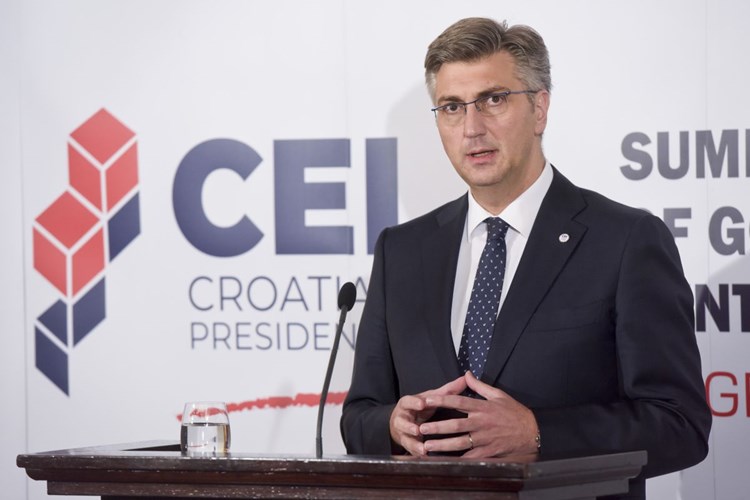- Published: 05.12.2018.
PM says lack of agreement on INA buyout price may become insurmountable problem
Prime Minister Andrej Plenkovic said on Tuesday that if Croatia and Hungary failed to reach agreement on the price at which MOL's stake in INA would be bought back by Croatia, that problem would become insurmountable because no one was in a position to set aside more funds than they could or should.
Responding to a reporter's question at a news conference after a summit of the Central European Initiative (CEI) in Zagreb, Plenkovic said that Hungary and Croatia had different views on the issue of INA.
"The price of restoring Croatian ownership of INA is not something that can be negotiated overnight nor is it that simple. Quite the contrary, we are aware of its complexity and ultimately, if we do not agree on a price, in my opinion, that may become an insurmountable problem because nobody can set aside more funds than they can or should," said Plenkovic.
The Croatian government has estimates, he said.
"We have rough estimates. What varies are broader details that can be important for energy companies, their future prospects and relevant global trends. However, we haven't done anything wrong in this case, quite the contrary, I believe that our decisions have been good and that that fact has even helped deal constructively with certain processes and problems. That was the content, spirit and tone of our meeting yesterday," said Plenkovic.
He reiterated that after his meeting with Hungarian Prime Minister Viktor Orban in Zagreb on Monday it was concluded that relations between Croatia and Hungary were very good and free of outstanding issues in terms of their good neighbourly relations, as well as that there were no problems in the two countries' relations regarding INA and MOL.
PM Orban said yesterday that Hungary saw the INA-MOL situation as an issue concerning the two companies.
In late 2016 Plenkovic said that the Croatian government had decided to restore its ownership of INA by buying back MOL's stake in INA, after Croatia lost a case filed against MOL before the United Nations Commission on International Trade Law in Geneva.
In mid-January last year, the government formed a council for negotiations with MOL regarding the possible purchase of shares held by that Hungarian company in INA, and in April this year it selected a consortium consisting of Morgan Stanley, Intesa Sanpaolo Group and Privredna Banka Zagreb as its investment consultant for the possible purchase of the stake and its possible subsequent sale to INA's new strategic partner. However, a contract with the consultants has not been signed yet.
Prime Minister Andrej Plenkovic said on Tuesday Finance Minister Zdravko Maric should not resign after the Conflict of Interest Commission decided that he had violated the principle of holding public office in the Agrokor case, stressing that the Commission did not examine "the concept of conflict of interest" and that it did not find that either Maric or former economy minister Martina Dalic had been in a conflict of interest.
"It's very important that this message be understood clearly, based on what and about what exactly the Commission was deciding. The Commission examined solely... the principles of holding office," he told reporters when asked if Maric should resign, as demanded by the opposition.
The Commission decided on Monday that Dalic and Maric had violated the principle of holding public office in the case of the indebted Agrokor food and retail conglomerate. The violation does not carry any penalties.
"When you have a serious situation, an emergency, the responsibility of the person running the government is big, and this is something which, in all the ex post comments and analyses, those who aren't in that position can't perceive at all," Plenkovic said, adding that everything that was done to prevent a major economic crisis was not perceived as it should have been.
"The real problem is minimised, while an approach which someone imagines should be taken in a crisis situation is maximised. The reality is somewhat different."
Not one cabinet member has at any moment violated the principles of holding public office, which are conscientious, responsible and unbiased conduct, guarding one's own credibility and the dignity of one's duties, Plenkovic said.
"Our moves were responsible, we weren't at the level of petty politics and lack of ideas as were the members of then opposition or today's opposition who were then part of the government. But that's their responsibility and something citizens will evaluate when assessing the contribution of every one of us."
Plenkovic said it had never been as clear as now who in politics was doing their job seriously, responsibly and in the interest of the Croatian citizens and economy, and who saw politics entirely differently. He accused "some political parties" of filing complaints to the Conflict of Interest Commission "to see what it will decide so that (they) can use politically later on."
Asked if former minister Dalic had asked him if the public should be told who was in the informal group that drew up the law on Agrokor's restructuring, Plenkovic said the government could but did not have to form working groups for some matters.
"If you have a company which is on the market and, at that point, is exposed to everything to which the market... if it sees a problem, responds very quickly, then it's wise, responsible, credible and appropriate that everything you do to prevent a bigger problem for Croatian society should be discrete and done in a way which won't additionally destabilise that market. It was necessary to ensure fresh liquidity for the company and this was done in a short time. That's the most important thing," he said.
He said everything concerning Lex Agrokor was done legally by consulting experts who could help draw up a law "which prevented an economic and financial crisis."
Text: Hina
